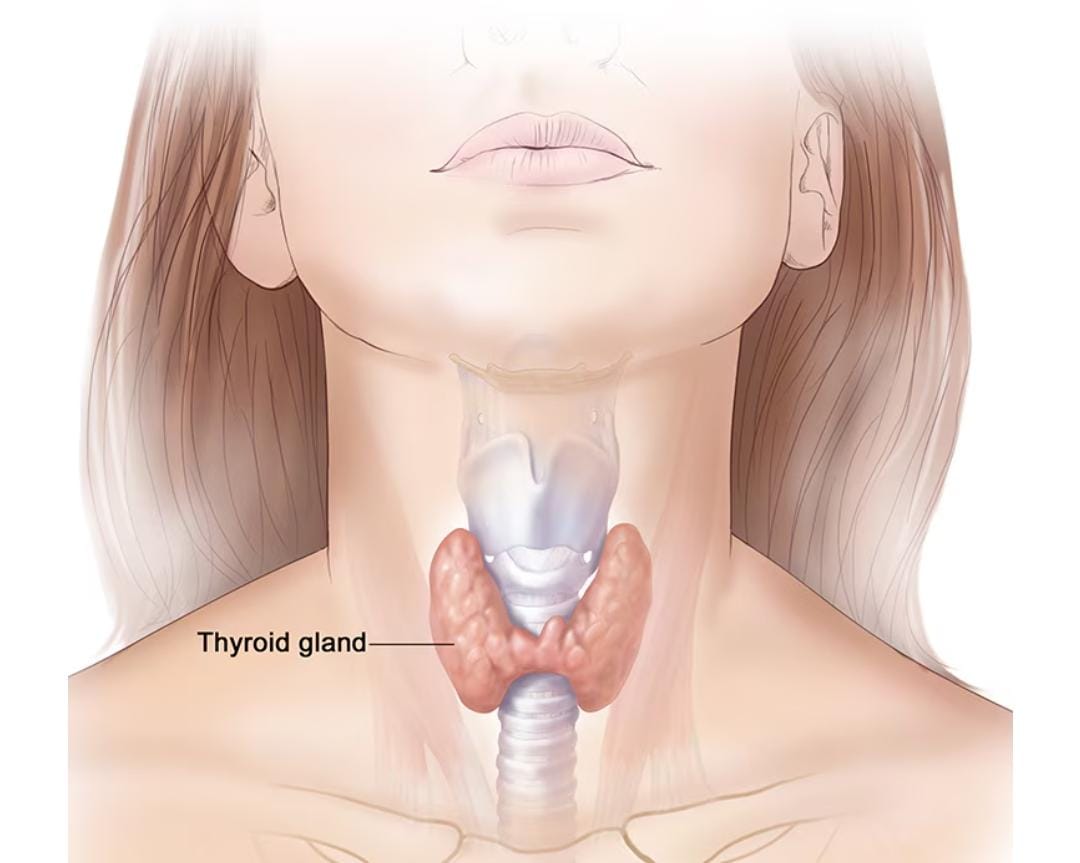
Contact Us
Online Appointments
- No exposure from potent chemicals.
- No withdrawal symptoms
- High efficacy rate
- Individualistic prescribing.
- Minimum dose.
- Rapid, gentle and permanent cure of disease.
- Holistic approach
- Painless process of treatment
- Availability of thousands of fully proved medicines on healthy human beings
- Economic medicines
Thyroid Diseases Treatment and Management
Thyroid Gland:
The thyroid is a butterfly-shaped gland located in the front of the neck just below the Adam’s apple. The gland wraps around the windpipe (trachea) and has a shape that is similar to a butterfly formed by two wings (lobes) and attached by a middle part (isthmus). The thyroid gland works like a tiny factory that uses iodine (mostly from the diet in foods such as seafood and salt) to produce thyroid hormones. These hormones help to regulate the body's metabolism and effects processes, such as growth and other important functions of the body.
The two most important thyroid hormones are thyroxine (T4) and triiodothyronine (T3), representing 99.9% and 0.1% of thyroid hormones respectively. The hormone with the most biological power is actually T3. Once released from the thyroid gland into the blood, a large amount of T4 is converted to T3 - the active hormone that affects the metabolism of cells throughout our body.
Thyroid Diseases:
The diseases that develop in the thyroid include:
• Hypothyroidism
• Goiter/Thyroid Nodules
• Thyroid Cancer
• Thyroiditis
Hypothyroidism:
Hypothyroidism (underactive thyroid) is a condition in which your thyroid gland doesn't produce enough of certain important hormones.
Women, especially those older than age 60, are more likely to have hypothyroidism. Hypothyroidism upsets the normal balance of chemical reactions in your body.
When the thyroid gland is underactive, improperly formed at birth, surgically removed all or in part, or becomes incapable of producing enough thyroid hormone, a person is said to be hypothyroid. One of the most common causes of hypothyroidism is the autoimmune disease called Hashimoto's disease, in which antibodies gradually target the thyroid and destroy its ability to produce thyroid hormone.
Causes of Hypothyroidism:
Hypothyroidism results when the thyroid gland fails to produce enough hormones. Hypothyroidism may be due to a number of factors, including:
• Autoimmune disease: People who develop a particular inflammatory disorder known as Hashimoto's thyroiditis suffer from the most common cause of hypothyroidism. Autoimmune disorders occur when your immune system produces antibodies that attack your own tissues. These antibodies affect the thyroid's ability to produce hormones.
• Treatment for hyperthyroidism: People who produce too much thyroid hormone (hyperthyroidism) are often treated with radioactive iodine or anti-thyroid medications to reduce and normalize their thyroid function. However, in some cases, treatment of hyperthyroidism can result in permanent hypothyroidism.
• Thyroid surgery: Removing all or a large portion of your thyroid gland can diminish or halt hormone production.
• Radiation therapy: Radiation used to treat cancers of the head and neck can affect your thyroid gland and may lead to hypothyroidism.
• Medications: A number of medications can contribute to hypothyroidism. One such medication is lithium, which is used to treat certain psychiatric disorders.
• Congenital disease: Some babies are born with a defective thyroid gland or no thyroid gland. In most cases, the thyroid gland didn't develop normally for unknown reasons, but some children have an inherited form of the disorder. Often, infants with congenital hypothyroidism appear normal at birth.
• Pituitary disorder: A relatively rare cause of hypothyroidism is the failure of the pituitary gland to produce enough thyroid-stimulating hormone (TSH) — usually because of a benign tumor of the pituitary gland.
• Pregnancy: Some women develop hypothyroidism during or after pregnancy (postpartum hypothyroidism), often because they produce antibodies to their own thyroid gland. Left untreated, hypothyroidism increases the risk of miscarriage, premature delivery and preeclampsia — a condition that causes a significant rise in a woman's blood pressure during the last three months of pregnancy. It can also seriously affect the developing fetus.
• Iodine deficiency: The trace mineral iodine — found primarily in seafood, seaweed, plants grown in iodine-rich soil, and iodized salt — is essential for the production of thyroid hormones. Conversely, taking in too much iodine can cause hypothyroidism.
Symptoms of Hypothyroidism:
The signs and symptoms of hypothyroidism vary, depending on the severity of the hormone deficiency. But in general, any problems you have tend to develop slowly, often over a number of years. Hypothyroidism signs and symptoms may include:
• Fatigue
• Increased sensitivity to cold
• Constipation
• Dry skin
• Unexplained weight gain
• Puffy face
• Hoarseness
• Muscle weakness
• Elevated blood cholesterol level
• Muscle aches, tenderness and stiffness
• Pain, stiffness or swelling in your joints
• Heavier than normal or irregular menstrual periods
• Thinning hair
• Slowed heart rate
• Depression
• Anxiety
• Impaired memory
Tests and Diagnosis of Hypothyroidism:
Blood tests for Hypothyroidism:
Diagnosis of hypothyroidism is based on your symptoms and the results of blood tests that measure the level of TSH and sometimes the level of the thyroid hormone thyroxine. A low level of thyroxine and a high level of TSH indicate an underactive thyroid. That's because your pituitary produces more TSH in an effort to stimulate your thyroid gland into producing more thyroid hormone.
Homeopathic Treatment of Hypothyroidism:
Hypothyroidism can be completely cured by homeopathic treatment. There are several medicines that are being used to treat and manage hypothyroidism i.e. calcarea carb, natrum mur, thyroidinum, digitalis, calc iod, iodum, bromium, bryonia etc.
Allopathic treatment for hypothyroidism involves daily use of the synthetic thyroid hormone levothyroxine (Levothroid, Synthroid, others). This oral medication restores adequate hormone levels, reversing the signs and symptoms of hypothyroidism but can not cure the sickness.
Hyperthyroidism:
Hyperthyroidism (overactive thyroid) is a condition in which your thyroid gland produces too much of the hormone thyroxin. Hyperthyroidism can accelerate your body's metabolism significantly, causing sudden weight loss, a rapid or irregular heartbeat, sweating, and nervousness or irritability.
When the thyroid gland becomes overactive and produces too much thyroid hormone, a person is said to be hyperthyroid. The most common cause of hyperthyroidism is the autoimmune condition known as Graves' disease, where antibodies target the gland and cause it to speed up hormone production.
Causes of Hyperthyroidism:
A number of conditions, including Graves' disease, toxic adenoma, Plummer's disease (toxic multinodular goiter), and thyroiditis, can cause hyperthyroidism.
Reasons for too much thyroxin (T-4):
Normally, your thyroid releases the right amount of hormones, but sometimes it produces too much T-4. This may occur for a number of reasons, including:
• Graves' disease: Graves' disease, an autoimmune disorder in which antibodies produced by your immune system stimulate your thyroid to produce too much T-4, is the most common cause of hyperthyroidism. Normally, your immune system uses antibodies to help protect against viruses, bacteria and other foreign substances that invade your body. In Graves' disease, antibodies mistakenly attack your thyroid and occasionally attack the tissue behind your eyes (Graves' ophthalmopathy) and the skin, often in your lower legs over the shins (Graves' dermopathy).
• Hyper functioning thyroid nodules (toxic adenoma, toxic multinodular goiter, Plummer's disease): This form of hyperthyroidism occurs when one or more adenomas of your thyroid produce too much T-4. An adenoma is a part of the gland that has walled itself off from the rest of the gland, forming noncancerous (benign) lumps that may cause an enlargement of the thyroid.
• Thyroiditis: Sometimes your thyroid gland can become inflamed for unknown reasons. The inflammation can cause excess thyroid hormone stored in the gland to leak into your bloodstream. One rare type of thyroiditis, known as subacute thyroiditis, causes pain in the thyroid gland. Other types are painless and may sometimes occur after pregnancy (postpartum thyroiditis).
Symptoms of Hyperthyroidism:
Hyperthyroidism can mimic other health problems, which may make it difficult for your doctor to diagnose. It can also cause a wide variety of signs and symptoms, including:
• Sudden weight loss, even when your appetite and the amount and type of food you eat remain the same or even increase
• Rapid heartbeat (tachycardia) — commonly more than 100 beats a minute — irregular heartbeat (arrhythmia) or pounding of your heart (palpitations)
• Increased appetite
• Nervousness, anxiety and irritability
• Tremor — usually a fine trembling in your hands and fingers
• Sweating
• Changes in menstrual patterns
• Increased sensitivity to heat
• Changes in bowel patterns, especially more frequent bowel movements
• An enlarged thyroid gland (goiter), which may appear as a swelling at the base of your neck
• Fatigue, muscle weakness
• Difficulty sleeping
• Skin thinning
• Fine, brittle hair
Tests and Diagnosis of Hyperthyroidism:
Hyperthyroidism is diagnosed using:
Medical history and physical exam: During the exam, your doctor may try to detect a slight tremor in your fingers when they're extended, overactive reflexes, eye changes and warm, moist skin. Your doctor will also examine your thyroid gland as you swallow.
Blood tests: A diagnosis can be confirmed with blood tests that measure the levels of thyroxine and TSH in your blood. High levels of thyroxin and low or non-existent amounts of TSH indicate an overactive thyroid. The amount of TSH is important because it's the hormone that signals your thyroid gland to produce more thyroxin. These tests are particularly necessary for older adults, who may not have classic symptoms of hyperthyroidism.
Treatment of Hyperthyroidism:
Several treatments for hyperthyroidism exist. The best approach for you depends on your age, physical condition and the severity of your disorder:
Homeopathic Treatment of Hyperthyroidism:
Hyperthyroidism can be successfully cured by homeopathic treatment. the frequentally prescribed medicines are iodum, thyroidinum, spongia, carcinosin, bromium etc.
Radioactive iodine: Taken by mouth, radioactive iodine is absorbed by your thyroid gland, where it causes the gland to shrink and symptoms to subside, usually within three to six months. Because this treatment causes thyroid activity to slow considerably, causing the thyroid gland to be underactive (hypothyroidism), you may eventually need to take medication every day to replace thyroxine. Used for more than 60 years to treat hyperthyroidism, radioactive iodine has been shown to be generally safe.
Anti-thyroid medications: These medications gradually reduce symptoms of hyperthyroidism by preventing your thyroid gland from producing excess amounts of hormones. They include propylthiouracil and methimazole (Tapazole). Symptoms usually begin to improve in six to 12 weeks, but treatment with anti-thyroid medications typically continues for at least a year and is often longer
Beta-blockers: These drugs are commonly used to treat high blood pressure. They won't reduce your thyroid levels, but they can reduce a rapid heart rate and help prevent palpitations.
Surgery (thyroidectomy): If you're pregnant or otherwise can't tolerate anti-thyroid drugs and don't want to or can't have radioactive iodine therapy, you may be a candidate for thyroid surgery, although this is an option in only a few cases. In a thyroidectomy, your doctor removes most of your thyroid gland.


